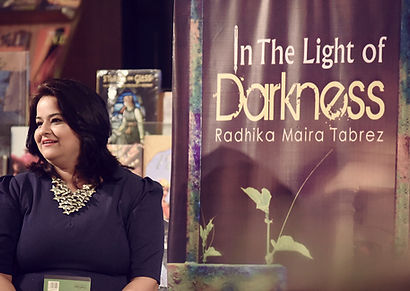Charred, yet not scarred
- radhika-maira-tabrez
- Sep 13, 2016
- 5 min read
The following piece was originally written for and first published in ThnkMkt Magazine.
Monika Singh, an NIFT student, worshipped Alexander McQueen and John Galliano, the famous multi-award winning British designers. She dreamed of studying fashion marketing at the prestigious Parsons School of Design in New York, someday; which boasts of alumni like Tom Ford and Marc Jacobs. You can’t be blamed for mistaking her for a girl next-door, with the usual hopes and dreams. That is, until you get to know that she is also an acid attack survivor. A bulb of acid thrown on her face in retaliation to a rejected marriage proposal, forty six excruciating reconstructive surgeries, ten long years to get a life back on track; these are the kind of challenges Monika has fought through and won. All for the sake of those dreams and ambition.
Sixteen year old Laxmi had applied to the famous T.V. show ‘Indian Idol’ and was waiting to hear from them, when one day, a thirty-two year old man threw acid on her face in the middle of a crowded Central Delhi market. That man, her friend’s brother, couldn’t handle his unwanted advances being spurned by her. Over the next ten years Laxmi lost her father. Her brother developed tuberculosis. Her family got seeped in heavy loans and their relatives deserted them. And all this, while she dealt with one painful surgery after another. But Laxmi didn’t let that become the synopsis of her life. Along with the Stop Acid Attacks organization, she launched the Change.org petition which garnered a record 27000 online signatures; becoming a catalyst for the Supreme Court’s 2013 landmark judgment regulating the sale of acids. In 2014 she was the youngest recipient of the ‘International Women of Courage’ awarded by the US Department of State, presented to her by First Lady Michelle Obama herself. The same year she was also chosen as the NDTV Indian of the Year.
Courage, they say, isn’t the absence of fear. It is, rather, the undying spirit to leap beyond that suffocating miasma of fear, to get to the glory that lies on the other side.
When Monika’s family’s savings were wiped off by endless surgeries and they could no longer support her New York dream, she turned to crowd-sourcing. The letter which she wrote to the world seeking their support, the one that came straight from her dauntless and optimistic heart, went on to collect a whopping $50,000 for her. That amount got her the much deserved spot at Parsons. When Laxmi’s face was burnt, she didn’t step out of her house or look into a mirror for years. Her relatives slyly suggested to her parents that they should have poisoned her while in the hospital. How, they argued with their misplaced sense of empathy, would the poor girl with such a horrible face go through life? Who will marry her when her own uncles and aunts couldn’t bear to look at her, even for a few seconds? That same Laxmi, today sparkles under the spotlights on huge billboards across many a cities, with a panache which would put supermodels to shame.
Sounds like a fairy tale, doesn’t it? Surprised at the fairy tale tag? Well, of course it is; replete with all the usual elements of one. There are fire spewing dragons which tried to burn not just these women’s faces, but their spirits too. There are dungeons, which the world wanted to confine them to; so we wouldn’t have to see our cowardice mirrored on their disfigured faces. Their tales had no Prince Charming, though. So they became their own saviors. And what great poetic justice they sought for themselves. A jilted lover wanted to turn Monika into a hideous monster; but now she is at the helm of the fashion and beauty industry. Everyone expected Laxmi to stay hidden indoors, until she is all but forgotten from our collective public memory; but she now smiles at us from billboards at major traffic signals.
These stories are as inspiring as it gets. And they are not the only ones.
Sonali Mukherjee, an acid attack survivor, became a common name in India after she participated in the famous T.V. show ‘Kaun Banega Crorepati’. It wouldn’t have been easy for her to face the glare of the camera, knowing that millions of eyes would be on her; a realization which can unnerve the best of us. But she did it, nevertheless, and won herself a neat 12.5 lakh in the process. But before all this happened, she had fought a long and ugly battle to bring the three men who ruined her life, to justice. It didn’t happen. They walked away scot-free, got married and started a new life. While Sonali’s family, already struggling to finance her never ending series of surgeries, went bankrupt with the legal fees. The world only took notice of her plight when she applied to the courts for euthanasia. But thanks to the money she won from the show and her sheer resolve, she turned her life around. Today, Sonali has a government job in Bokaro and is happily married to Chittaranjan Tiwari, an engineer who fell in love with Sonali’s steely grit.
Then there are Ritu, Rupa, Neetu and Geeta – members of the team that runs Sheroes Hangout, a café in Agra managed solely by acid attack survivors. The café and its popularity are the result of the resilience of these women, who quite literally, rose from the ashes. In the first six months of its operation, it attracted 5000 customers, most of whom admit that sheer curiosity was what brought them there. If they walked in, with a tinge of adulation, they walked away hugely inspired and as loyal customers. The gaiety with which these women run Sheroes Café, bounces off its artfully done up walls and lights up the whole place. It is hard to miss the confidence with which they handle their affairs, totally unperturbed by the surreptitious intentional and unintentional stares of people around them. They have adjusted quite comfortably, to a world which still often struggles to adjust to the sight of them. They have forgiven the world too graciously; a world which deserted them in their hour of need and struggle.
Some of them have lost their sight, some their speech, some even the use of a limb. And yet, their spirits are more wholesome and brighter than the most of us. Almost all of them have lost their face to acid-burns. And yet their identities are far more remarkable. Because they are now defined by who they chose to become, after everything that they were, was burned to the ground. Their faces may be scarred, but their hearts are not; they are blithe and beautiful.
In the words of Laxmi, a part of her poem she recited at the International Women of Courage Awards ceremony and the one that got her a standing ovation from the audience;
“The face you burned is the face I love. I am flourishing.”



















コメント